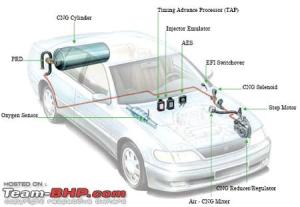Environmental Benefits
Natural gas is the cleanest burning alternative transportation fuel available today that can economically power light-medium, and heavy-duty vehicles as well as many non-road vehicles, such as rail and marine vehicles. Whether in the form of compressed natural gas (CNG) or liquefied natural gas (LNG), natural gas is a proven alternative fuel that significantly improves local air quality and reduces greenhouse gases (GHG).
Natural gas rises and disperses quickly, so in the event of a leak or emergency venting, surrounding ecosystems and water systems are not threatened.
Emission Benefits
Natural gas vehicles (NGV), as well as diesel and gasoline vehicles, are delivering superior emissions compared to what was achievable just a few years ago. An NGV that has continued to provide improved emissions throughout the years is the Honda Civic Natural Gas. The CNG-powered Civic was once characterized by EPA as the cleanest commercially available internal-combustion vehicle on earth. Compared to its gasoline-burning counterpart, the 2013 version of the Civic Natural Gas produces 80 percent fewer emissions of non-methane hydrocarbons and 50 percent fewer emissions of nitric oxide (NO), which contribute to ozone depletion. It also produces 67 percent less carbon monoxide than gasoline.
The light-duty Honda Civic Natural Gas held the American Council for An Energy-Efficient Economy’s (ACEEE) title of “Greenest Vehicle” for eight consecutive years.
Natural gas vehicles generally emit 13-21 percent fewer GHG emissions than comparable gasoline and diesel vehicles. Natural gas primarily consists of methane (around 90 percent), with small amounts of ethane, propane, and other gases. Methane is lighter than air and burns almost completely, creating carbon dioxide and water as by products.
Greenhouse Gas Emissions
Natural gas contains less carbon than any other fossil fuel and in turn produces fewer carbon dioxide (CO2) emissions when burned. While natural gas vehicles do emit methane, another principle greenhouse gas, the increase in methane emissions is more than offset by a substantial reduction in CO2 emissions. The California Air Resources Board (CARB) has conducted extensive analysis on this issue. CARB concludes that CNG fueled vehicle emits 20 to 29 percent fewer greenhouse gas emissions than a comparable gasoline or diesel fueled vehicle. For natural gas vehicles that run on bio methane, the greenhouse gas emissions reduction approaches 90 percent.
Economic Benefits
The compressed natural gas industry helps to support US jobs and the economy and creating reduced fuel prices. Natural gas represents almost a 50% savings over petroleum products such as gasoline and diesel fuel. Over the last decade, the average cost per gallon of gasoline in the United States has risen approximately 140%. In 2004, the average price per gallon of gasoline was $1.50, today the average price is around $3.60, and the costs are expected to continue to rise. In a very competitive economy, there is no better time to look for alternative ways to fuel our vehicles.
Overall, compressed natural gas and liquefied natural gas are both clean-burning and perform well against current vehicle emissions standards. Though using natural gas for vehicle fuel is more efficient, benefits the economy, and cleaner for the air; it is still a fossil fuel, so there is not an unlimited supply available for our disposal.
http://automobiles.honda.com/civic-natural-gas/
http://www.cngnow.com/vehicles/Pages/information.aspx
http://www.bankrate.com/finance/auto/natural-gas-vehicles.aspx




I love the idea of a car run on natural gas. I think that its a great alternative to the liquid gasoline we use now made out of oil, however just like what we use now it is a nonrenewable resource and we can only use so much of it.
LikeLike
I had never thought of using natural gas as a way for natural gas to provide fuel for cars and it is a great idea, but is still a unrenewable resource so we will eventually run out of it. I really liked how you split your discussions into different categories and titled them. Nice touch.
LikeLike